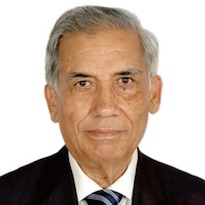GS6 Speakers
President, The Association of Academies and Societies of Sciences in Asia (AASSA); Immediate Past President of The Indian National Science Academy.
Challenges in Ensuring Gender Equality in Science and Technology in the Asia Pacific Region (download presentation here ![]() )
)
Plenary Panel 5: Developing Leadership Capacity for Gendered Innovations through Scientific, Technology and Policy Networks
Professor Krishan Lal is President of The Association of Academies and Societies of Sciences in Asia (AASSA) and is Immediate Past President of The Indian National Science Academy (INSA). He is a Foreign Member of Russian Academy of Sciences. He has been Director of India's National Physical Laboratory and was President of the International Council for Science (ICSU) Multi-disciplinary Body the Committee on Data for Science and Technology (CODATA).
Other significant recognitions include an Honorary Doctorate from the Russian Academy of Sciences (1998) and a Fellowship at the National Academy of Sciences' India, Allahabad. He has also been IBM India Fellow at Watson Research Centre, New York; Visiting Professor at the University of Tokyo, Japan; the Technical University Darmstadt, Germany, and Senior Visiting Scientist at Physikalisch-Technische Bundesanstalt, Braunschweig. He is Honorary Professor at the Indian Institute of Technology (IIT), Kanpur, Honoray Professor for Life of the University of Delhi, and Visiting Professor of Panjab University, Chandigarh. He has been Visiting Professor at IIT Delhi and Jamia Millia Islamia and Adjunct Professor at IIT Kharagpur. He obtained his PhD in Solid State Physics from the University of Delhi in 1969 and has made significant contributions in research and development, scientific leadership, and developing international collaboration. His research on lattice imperfections in crystals, X-ray diffraction physics, and crystal growth has led to deeper understanding of the nature of real materials and their interaction with radiation and external fields. He has edited nine books/volumes, published 22 Invited Papers in journals/chapters in books, and more than 100 research papers in refereed journals as well as having seven patents to his credit.
Summary of talk for Gender Summit 6 Asia-Pacific:
Achieving gender parity in all spheres of life is a major global challenge and it has been one of the Millennium Development Goals. Also, this aspect is being emphasized in the Sustainable Development Goals. There is a need to remove all types of discrimination against the girl child and provide them opportunities equivalent to those available to the boys. The participation of women in S&T endeavors is far from satisfactory and therefore sustained efforts are being made to change the situation. The Asia-Pacific region is very diverse in terms of the economic levels of different countries as well as in the state of S&T. However, the positive sign is very high enrolment of female students in higher education and increasing number of young female researchers. There are several good examples of achievements of female scientist and technocrats. Dr Soraya Popal is President of Academy of Sciences of Afghanistan. The percentage of women Fellows of the Turkish Academy of Sciences (TUBA) is ~20%, perhaps highest in the world. Dr. Kiran Mazumdar-Shaw has made a mark at global level as the founder of a successful high-tech company Biocon. Several governments are introducing new schemes to enable women scientists to remain active in research and to take care of families, particularly that of the young kids. Recently, the Department of Science and Technology of Government of India has started a scheme DISHA, under which women scientists are allowed several breaks and possibilities of rejoining the S&T mainstream until the age of retirement. As a consequence of the recommendations of the Workshop on Women in Science at New Delhi, the Indian National Science Academy had created a special Panel for Women scientists. AASSA is at present undergoing a review of its activities by an External Panel. One of the terms of reference is, “To suggest strategies to enhance participation of young scientists and women scientists in AASSA activities”. AASSA will make every effort to work on the recommendations on this and other aspects. However, continuous efforts are needed on a long term basis for improvement in the overall situation.

